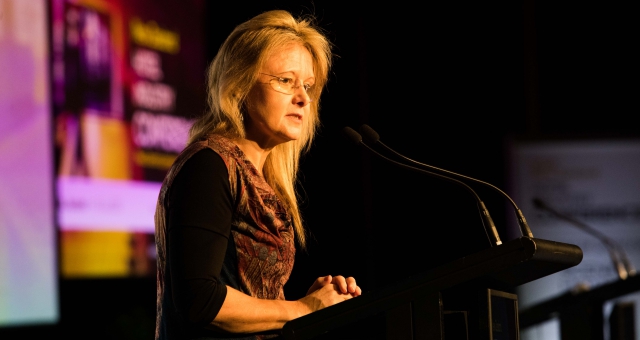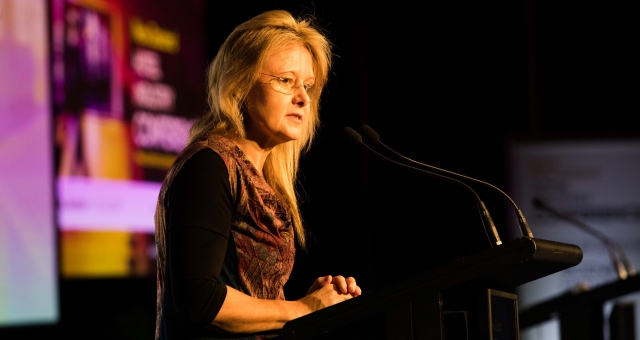
By Nikki Birrell at NZHIC in Auckland
A record number of over 630 people attended the 11th New Zealand Hotel Industry Conference (NZHIC) held over two days in Auckland this week (July 4-5) incorporating a conference, exhibition and hotel awards dinner.
Several key issues raised repeatedly throughout day two were outlined by Scenic Hotel Group Chairwoman of the Board, Lani Hagaman, in her welcoming address.
Hagaman questioned legislation and costs incurred by hotels in comparison to Airbnb. She also captured much of the resentment established accommodation providers have about the Auckland targeted rate – a tax – set by Auckland council, as well as the proposed border tax by Central Government and how it would be distributed and spent.
“Treat us all the same. Regulate us all the same. Tax us all the same. Let’s not kill the goose who lays the golden egg – be fair,” she said.
Tourism Industry Aotearoa (TIA) CEO, Chris Roberts, focused on the New Zealand Tourism Sustainability Commitment, which aims to see every New Zealand tourism business committed to sustainability by 2025.
The border tax is proposed as a $25-35 per-international visitor levy by the new Labour government, with those from Australia and the Pacific Islands exempt.
It’s projected to result in $57-80 million revenue a year, to be split between conservation and tourism. Further consultation on how the money would be distributed closes on July 22 and Roberts implored the industry to make direct submissions.
An engaging presentation by keynote speaker, Air New Zealand CEO Christopher Luxon, was a highlight as he announced new routes to Taipei and Chicago, Luxon outlined that tourism is 10% of the New Zealand economy; 12% of the NZ workforce; 17% of New Zealand’s total GST; and 21% of New Zealand’s total exports as well as sharing more data which proves how critical the tourism industry is to New Zealand.
In a panel about “managing rapid change” Andrew Scott-Howman, Barrister, Port Nicholson Chambers said in an age of immediate and widespread negative feedback, it was important for controversy to addressed quickly rather than ignored. “[Silence] creates a vacuum which will be filled by the media if you don’t react accordingly,” he said.
On the hotel leader’s panel, Ryan Sanders, Founder, Haka Tourism Group, said it was important to reach out to those who are inspirational and aspirational in their industry. Sanders said it was a strategy he employed himself to launch his business and noted nobody had said no to him yet.
On the F&B panel, Site Hospitality Managing Director Dave Galvin, said dining environments are changing more frequently than in the past to meet ever-changing consumer demand. To keep up, Galvin said F&B staff needed to be aware that customers are viewing everything through a lens – meaning their phone cameras – and eating with their eyes via apps such as Instagram.
Todd Wynne-Parry, Vice President, Global Acquisitions and Development, Two Roads Hospitality, gave an overview of the US hotel market and made a heartening plea to get more females into leadership, onto the conference stage and into the audience, especially considering women make up at least 50% of tourists and the local industry workforce.
Dominick Stephens, Chief Economist, Westpac, gave the audience an economic outlook: with key news being that the dollar looks set to drop substantially, meaning increased visitors.
Matthew Griffin, Professional Service Manager of BlockchainLabs NZ, outlined an increasingly popular way of managing data and how it could become increasingly more relevant for hospitality groups. Griffin explained how the ease of sending, receiving, storing, and trading digital currencies with blockchain technology would make it hard to ignore.
The conference ended with the 2018 New Zealand Hotel Industry Awards gala dinner, where it was noteworthy that several of the awards were handed out to regions outside the main centres.

